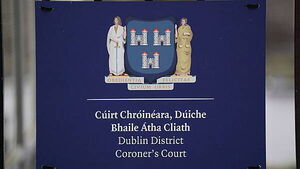Measure to prevent drones dropping contraband in prisons is '100 per cent' successful, inquest hears

Seán McCárthaigh
A new type of netting used at Mountjoy Prison has been “100 per cent” successful in stopping drones from dropping contraband into the prison yard, an inquest has heard.
Assistant governor of Cloverhill Prison, Mark Delaney, told a sitting of Dublin District Coroner’s Court that the success of the pilot project at Mountjoy meant such netting was now being rolled out across the prison network.
Mr Delaney made his comments in response to questions from coroner, Aisling Gannon, over how three vulnerable individuals had managed to have a large volume of different drugs as well as hooch (homemade alcohol) in their cell in Cloverhill Prison in a case involving a death in custody.
One of the prisoners, Gary Donoghue, told the hearing about his experience in Cloverhill where “drugs just fall out of the sky every day.”
The inquest heard another prisoner, Alan Minto, who had surrendered his bail in the hope of getting drug treatment in prison, died from a multi-drug overdose while awaiting trial.

Mr Minto (34), a father of two from Grangeview Road, Clondalkin, Dublin was found in an unresponsive state by prison staff after the alarm was raised by his two cellmates on August 12th, 2021.
The inquest heard the three prisoners had consumed drugs including heroin and hooch in their cell after they were locked in at 7pm the previous evening.
The deceased was a remand prisoner since May 2021 and was due to go on trial for drug-related offences on August 24th, 2021.
The deceased’s father, Alan Minto senior, told the hearing that his son had been in Cloverhill as he had surrendered his bail in the hope of getting drug counselling in the prison.
Asked about the response of the response of the Irish Prison Service to recommendations made by the Office of the Inspector of Prisons (OIP) following an investigation into Mr Minto’s death, Mr Delaney said the new type of mesh net would be fully installed across six open areas in Cloverhill by the end of 2026.
He said the IPS also worked with gardaí to prevent contraband being thrown into the prison and noted there had been over 30 related arrests in a recent 13-month period compared to six during the year that Mr Minto died.
The inquest heard information leaflets are also placed in cells to inform inmates about new drugs being found in prisons.
The assistant governor said a review of CCTV footage in Cloverhill going back 72 hours before Mr Minto’s death had not been able to establish how the deceased or his two other cellmates had obtained drugs within the prison.
However, Mr Delaney said the drugs would have been acquired via the prison yard but there was no recording of any “handovers”.
He said all cells were checked every morning but there was no legislation to allow invasive searches of prisoners.
The inquest heard Mr Minto’s cell has last been searched as part of regular random searches on July 25th, 2021 – 18 days before his death.
He accepted that the hooch was either made within the cell or brought into it over 72 hours before Mr Minto died.
Mr Delaney observed that drugs were prevalent in society and that what existed in the community was often “reflected and amplified” in prison.
IPS national operational nurse manager, Enda Kelly, told the inquest that the use of technology to monitor the vital signs of prisoners suspected of having consumed drugs was under consideration.
Mr Kelly said the use of a prolonged-release injection as an alternative treatment for opioid addiction was also being examined.
State pathologist, SallyAnne Collis, gave evidence that Mr Minto had died as a result of multi-drug intoxication including cocaine, benzodiazepines, heroin and alcohol.
Giving evidence via videolink from prison, Mr Donoghue said his cellmate was placed on a bottom bunk bed in a recovery position around 3:30am over concern he might fall out of his upper bunk bed.
The witness said he slept on the floor so that he could keep an eye on Mr Minto after he had got sick.
Mr Donoghue said their other cellmate, Anthony Purcell, alerted him around 7am that Mr Minto was unresponsive.
He recalled “brown stuff” was coming out of Mr Minto’s mouth as they tried CPR on him for a number of minutes before they screamed for help from prison staff.
Mr Donoghue estimated that it had taken “10-15 minutes” for prison staff to arrive which “felt like a lifetime.”
However, the inquest heard CCTV footage showed it took three minutes before a prison officer checked the cell in response to the alarm and another three minutes before the cell door was opened.
A prison officer who had carried out regular checks on the cell during the night, Cathal Daly, said he had no concerns about any of the occupants at any time.
Two prison nurses, Miriam Dunne and Jennifer Bolster, gave evidence of providing appropriate care and treatment to Mr Minto after being called to his cell.
In reply to questions from solicitor for Mr Minto’s family, James MacGuill, Ms Dunne agreed drugs have been a problem in Cloverhill for many years, while Ms Bolster said she was not surprised that Mr Minto had access to drugs in the prison.
A jury of five men and four women recorded a verdict of death by misadventure.
They also adopted a submission made by Mr MacGuill that the State should provide all the necessary resources to implement recommendations made by the OIP.
The jury also recommended that defibrillators should be made more widely available across every floor in all prisons.




